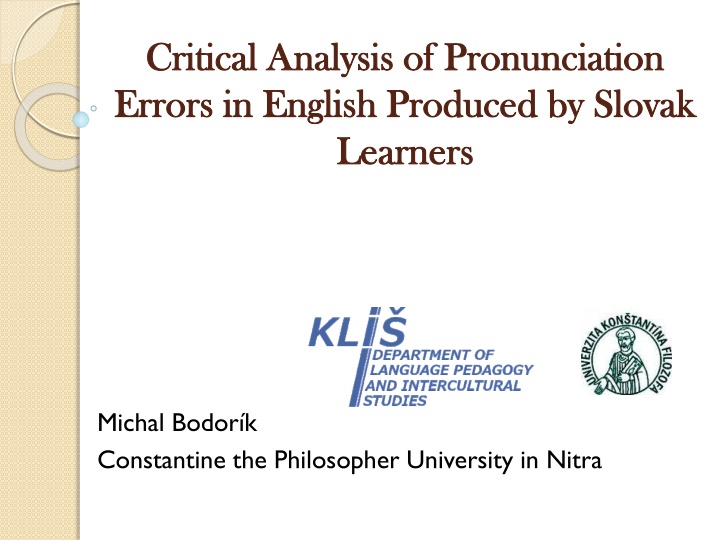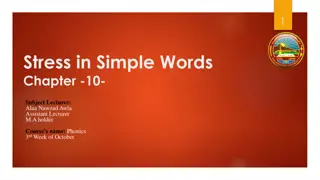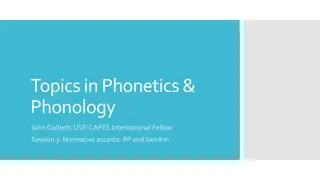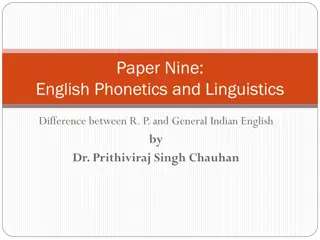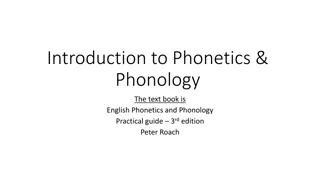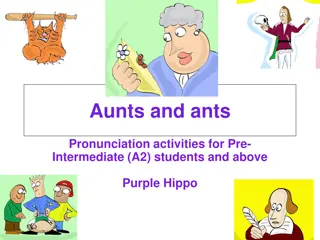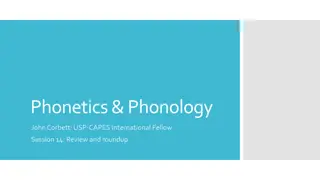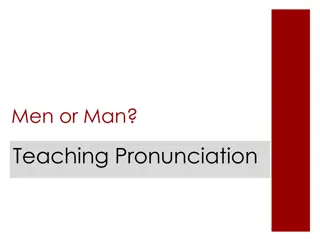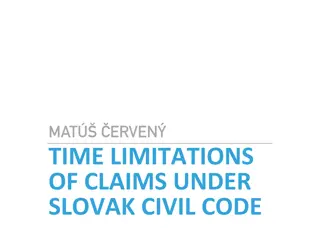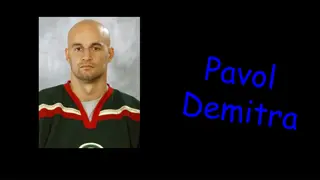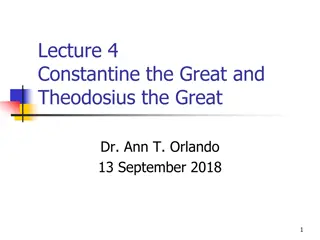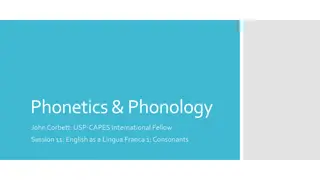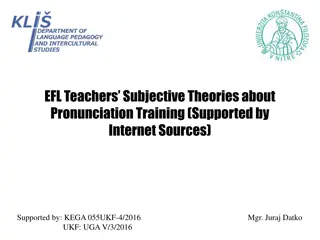Pronunciation Errors in English Produced by Slovak Learners at Constantine the Philosopher University
This study explores pronunciation errors made by Slovak learners of English at Constantine the Philosopher University in Nitra. It provides a critical analysis of the challenges faced by these learners and offers insights into improving their pronunciation skills.
Download Presentation

Please find below an Image/Link to download the presentation.
The content on the website is provided AS IS for your information and personal use only. It may not be sold, licensed, or shared on other websites without obtaining consent from the author.If you encounter any issues during the download, it is possible that the publisher has removed the file from their server.
You are allowed to download the files provided on this website for personal or commercial use, subject to the condition that they are used lawfully. All files are the property of their respective owners.
The content on the website is provided AS IS for your information and personal use only. It may not be sold, licensed, or shared on other websites without obtaining consent from the author.
E N D
Presentation Transcript
Critical Analysis of Pronunciation Critical Analysis of Pronunciation Errors in English Produced by Slovak Errors in English Produced by Slovak Learners Learners Michal Bodor k Constantine the Philosopher University in Nitra
General Information The following presentation and article for publishing discusses the partial results from the research of the author s dissertation thesis under the title: Pronunciation Pronunciation Difficulties Difficulties in in Slovak Production Productionin inEnglish English The whole process and findings were supported by the following projects: Slovak Learners Learners Oral Oral KEGA:055UKF-4/2016 UKF:UGAV/2/2016
Research Procedure Recording of learners speech in English 20 respondents 9th grade learners 2 elementary schools Reviewing process (2 native speakers + 2 non-native professionals) Error Analysis Summarizing Research Findings Suggestions for Teaching Practice
1st Reviewer (sheet with marked pronunciation errors)
2nd Reviewer (sheet with marked pronunciation errors)
Codes for Pronunciation Errors (based on the reviewers opinions when listening to the recordings) 1. 1. Substitution of a Substitution of a Consonant Sound 2. 2. Substitution of a Substitution of a Vowel Sound 3. 3. Substitution of a Diphthong or Substitution of a Diphthong or Triphthong 4. 4. Lengthening or Shortening of a Vowel Lengthening or Shortening of a Vowel Sound Sound 5. 5. Incorrect Placement of Stress Incorrect Placement of Stress 6. 6. Pronunciation of Silent Letters Pronunciation of Silent Letters 7. 7. Mispronunciation of a Word Mispronunciation of a Word Consonant Sound Vowel Sound Triphthong
Substitution of a Substitution of a Consonant Sound Consonant Sound ( (most frequented pronunciation errors within the code most frequented pronunciation errors within the code) ) most frequented: / / /d/ in words such as: other, than, that, the, there, this. 2nd frequented: / / changed for combination of sounds /ng/ or /nk/ in words such as: becoming, doing, playing, watching, young. 3rd frequented: /w/ /v/ in words like: everywhere, Norway, we, were, words, world. 4th frequented: / / /t/ or /f/ in cases like: things, thousand, three. 5th frequented: English phoneme /r/ pronounced as Slovak trilled r reading, Viking,
Substitution of a Substitution of a Vowel Sound ( (most frequented pronunciation errors within the code most frequented pronunciation errors within the code) ) Vowel Sound Replacement of schwa sound / / by / /, /e/, / /, / /, / /, /i:/, /u:/, /e /, /e / etc.; like in words: German /d erm n/, difficult /d f k lt/, Saxons /s ks nz/. Substitution of phoneme / / for / / in words like becoming /b k m nk/, front /fr nt/. Phoneme / / was changed either for / / or /e/ as in the example: Anglo-Saxons / l seks nz/. The vowel sound / / was substituted by phoneme /e/ in words such as: English /e l /, enough /e n f/.
Substitution of a Diphthong or Substitution of a Diphthong or Triphthong ( (most frequented pronunciation errors within the code most frequented pronunciation errors within the code) ) Triphthong Various forms of substitution were present as shown in the chart below. /a / /a / violence /a / / / by,satellite,Vikings / / / / most,programmes /e / /e/ change,teenager /e / / / came /e / / / became
Lengthening or Shortening of a Vowel Sound Lengthening or Shortening of a Vowel Sound ( (most frequented pronunciation errors within the code most frequented pronunciation errors within the code) ) Phoneme / / was pronounced longer as /i / in the word this. Long vowel / / sounded shorter as / / in the case of word Denmark. Phoneme /i:/ was shortened in the case of these /d z/. Long vowel sound / / was pronounced shorter as / / in words such as according, Norway. Phoneme /u / was pronounced as / / in the word groups /gr ps/.
Incorrect Placement of Stress Incorrect Placement of Stress ( (most frequented pronunciation errors within the code most frequented pronunciation errors within the code) ) The respondents put stress on inappropriate syllables as shown in the examples below. (all of the words are transcribed also with errors as originally pronounced by learners) always - / we z/ aristocracy / r st kres / developed / devel pt/ enough / en f/ Saxons /s k s ns/
Pronunciation of Silent Letters Pronunciation of Silent Letters ( (most frequented pronunciation errors within the code most frequented pronunciation errors within the code) ) Within the recordings, reviewers found pronounced letters that should have been silent. answer hours know talk
Mispronunciation of a Word Mispronunciation of a Word ( (most frequented pronunciation errors within the code most frequented pronunciation errors within the code) ) Some words were completely garbled which affected the intelligibility. almost / lm st/, also / lz / /eksper ents s/, began /b k n/, /k kw red/, health /h lt/ Europe /e r p/, France /frents/, know /kna /, ordinary / r d n r /, prove /pr /, tribes /tr bes/ to /d /, young /d g/ or /d nk/, studies /st d /, us /j z/, used /j set/, word /v rt/. Other were pronounced as similar words, examples below. OriginalWord Pronounced as: or / ls /, /br gt/, experiences conquered brought OriginalWord Pronounced as: with which words worlds what watch AD aid live /l v/ live /la v/ our or be by when where
Suggestions for Suggestions for Furt Teaching Practice Teaching Practice Further Research and her Research and Informing the academic public about the research findings. Cooperation with researchers experience and knowledge. Design of textbook material suitable for Slovak learners needs with regard to pronunciation aspects. Survey aimed at the observation of contemporary English classes at elementary schools how and what Slovak teachers practice throughout the lessons. Improvement of university courses that prepare future teachers for their profession. Provision of opportunities programmes, seminars, stays abroad, workshops, etc.) for educators to improve their pronunciation and skills. abroad, exchange of (conferences, exchange teaching
Thank you for your attention "To have another language is to possess a second soul." Charlemagne
